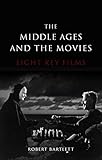The middle ages and the movies : eight key films / Robert Bartlett
Material type: TextLanguage: English Publication details: London : Reaktion Books, 2022Description: 288 pages : illustrations ; 23 cmISBN:
TextLanguage: English Publication details: London : Reaktion Books, 2022Description: 288 pages : illustrations ; 23 cmISBN: - 9781789145526
- 178914552X
- PN 1995.9 B291m 2022
| Item type | Current library | Home library | Collection | Shelving location | Call number | Copy number | Status | Barcode | |
|---|---|---|---|---|---|---|---|---|---|
 Libro
Libro
|
Biblioteca Juan Bosch | Biblioteca Juan Bosch | Humanidades | Humanidades (4to. Piso) | PN 1995.9 B291m 2022 (Browse shelf(Opens below)) | 1 | Available | 00000168357 |
Browsing Biblioteca Juan Bosch shelves, Shelving location: Humanidades (4to. Piso), Collection: Humanidades Close shelf browser (Hides shelf browser)

|

|

|

|

|

|

|
||
| PN 1995.9 B268u 2015 Ultimate Star Wars / | PN 1995.9 B276m 2017 Must-see musicals : 50 show-stopping movies we can't forget / | PN 1995.9 B282n 1973 Nonfiction film; a critical history. | PN 1995.9 B291m 2022 The middle ages and the movies : eight key films / | PN 1995.9 B336i 2013 Independent film producing : how to produce a low-budget feature film / | PN 1995.9 B361b 2014 Between the scenes : what every film director, writer, and editor should know about scene transitions / | PN 1995.9 B365i 2008 Indiana Jones : off the beaten path : an unofficial expedition / |
Description based upon print version of record
Includes bibliographical references and index.
Preface: medieval history on the screen
Sex and nationalism: Bravehart (1995)
From page to screen: The name of the rose (1986)
Now for something completely different: Monty Python and the Holy Grail (1975)
The artist and the state: Andrei Rublev (1966)
Playing chess with death: The seventh seal (1957)
Heroic leadership: Alexander Nevsky (1938)
A silent epic: Die Nibelungen I: Siegfried (1925)
Wrapping up.
In The Middle Ages and the Movies eminent historian Robert Bartlett takes a fresh, cogent look at how our view of medieval history has been shaped by eight significant films of the twentieth century. The book ranges from the concoction of sex and nationalism in Mel Gibson's Braveheart, to Fritz Lang's silent masterpiece Siegfried, the art-house classic The Seventh Seal to Tarkovsky's Andrei Rublev and the epic historical drama El Cid. The historical accuracy of these films is examined, as well as other salient aspects - how was Umberto Eco's Name of the Rose translated from page to screen? Why is Monty Python and the Holy Grail funny? And how was Eisenstein's Alexander Nevsky shaped by the Stalinist tyranny under which it was filmed?
There are no comments on this title.

